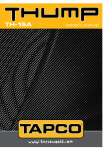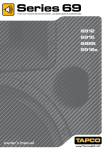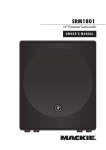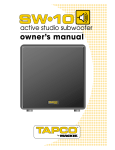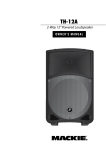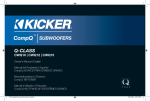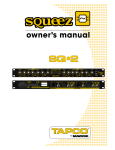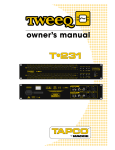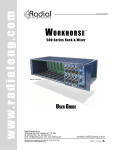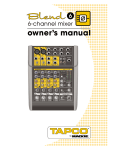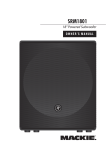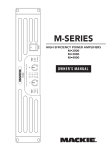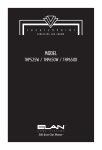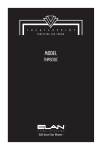Download Mackie J800 Operating instructions
Transcript
CAUTION AVIS RISK OF ELECTRIC SHOCK DO NOT OPEN RISQUE DE CHOC ELECTRIQUE NE PAS OUVRIR CAUTION: TO REDUCE THE RISK OF ELECTRIC SHOCK DO NOT REMOVE COVER (OR BACK) NO USER-SERVICEABLE PARTS INSIDE REFER SERVICING TO QUALIFIED PERSONNEL ATTENTION: POUR EVITER LES RISQUES DE CHOC ELECTRIQUE, NE PAS ENLEVER LE COUVERCLE. AUCUN ENTRETIEN DE PIECES INTERIEURES PAR L'USAGER. CONFIER L'ENTRETIEN AU PERSONNEL QUALIFIE. AVIS: POUR EVITER LES RISQUES D'INCENDIE OU D'ELECTROCUTION, N'EXPOSEZ PAS CET ARTICLE A LA PLUIE OU A L'HUMIDITE The lightning flash with arrowhead symbol within an equilateral triangle is intended to alert the user to the presence of uninsulated “dangerous voltage” within the product’s enclosure that may be of sufficient magnitude to constitute a risk of electric shock to persons. Le symbole éclair avec point de flèche à l'intérieur d'un triangle équilatéral est utilisé pour alerter l'utilisateur de la présence à l'intérieur du coffret de “voltage dangereux” non isolé d'ampleur suffisante pour constituer un risque d'éléctrocution. The exclamation point within an equilateral triangle is intended to alert the user of the presence of important operating and maintenance (servicing) instructions in the literature accompanying the appliance. Le point d'exclamation à l'intérieur d'un triangle équilatéral est employé pour alerter les utilisateurs de la présence d'instructions importantes pour le fonctionnement et l'entretien (service) dans le livret d'instruction accompagnant l'appareil. SAFETY INSTRUCTIONS 1. Read Instructions — All the safety and operation instructions should be read before this product is operated. 2. Retain Instructions — The safety and operating instructions should be kept for future reference. 3. Heed Warnings — All warnings on this product and in these operating instructions should be followed. 4. Follow Instructions — All operating and other instructions should be followed. 5. Water and Moisture — This product should not be used near water – for example, near a bathtub, washbowl, kitchen sink, laundry tub, in a wet basement, near a swimming pool, etc. 6. Cleaning — Clean only with a dry cloth. 7. Ventilation — This product should be situated so that its location or position does not interfere with its proper ventilation. For example, the Component should not be situated on a bed, sofa, rug, or similar surface that may block any ventilation openings, or placed in a built-in installation such as a bookcase or cabinet that may impede the flow of air through ventilation openings. 8. Heat — This product should be situated away from heat sources such as radiators, or other devices which produce heat. 9. Power Sources — This product should be connected to a power supply only of the type described in these operation instructions or as marked on this product. 12. Damage Requiring Service — This product should be serviced only by qualified service personnel when: A. The power-supply cord or the plug has been damaged; or B. Objects have fallen, or liquid has spilled into this product; or C. This product has been exposed to rain; or D. This product does not appear to operate normally or exhibits a marked change in performance; or E. This product has been dropped, or its chassis damaged. 13. Servicing — The user should not attempt to service this product beyond those means described in this operating manual. All other servicing should be referred to the Tapco Service Department. 14. To prevent electric shock, do not use this polarized plug with an extension cord, receptacle or other outlet unless the blades can be fully inserted to prevent blade exposure. Pour préevenir les chocs électriques ne pas utiliser cette fiche polariseé avec un prolongateur, un prise de courant ou une autre sortie de courant, sauf si les lames peuvent être insérées à fond sans laisser aucune pariie à découvert. 15. Grounding or Polarization — Precautions should be taken so that the grounding or polarization means of this product is not defeated. 16. Power Precaution — Unplug this product during lightning storms or when unused for long periods of time. 17. This apparatus does not exceed the Class A/Class B (whichever is applicable) limits for radio noise emissions from digital apparatus as set out in the radio interference regulations of the Canadian Department of Communications. ATTENTION —Le présent appareil numérique n’émet pas de bruits radioélectriques dépassant las limites applicables aux appareils numériques de class A/de class B (selon le cas) prescrites dans le règlement sur le brouillage radioélectrique édicté par les ministere des communications du Canada. 18. Exposure to extremely high noise levels may cause permanent hearing loss. Individuals vary considerably in susceptibility to noise-induced hearing loss, but nearly everyone will lose some hearing if exposed to sufficiently intense noise for a period of time. The U.S. Government’s Occupational Safety and Health Administration (OSHA) has specified the permissible noise level exposures shown in the following chart. According to OSHA, any exposure in excess of these permissible limits could result in some hearing loss. To ensure against potentially dangerous exposure to high sound pressure levels, it is recommended that all persons exposed to equipment capable of producing high sound pressure levels use hearing protectors while the equipment is in operation. Ear plugs or protectors in the ear canals or over the ears must be worn when operating the equipment in order to prevent permanent hearing loss if exposure is in excess of the limits set forth here. Duration Per Day Sound Level dBA, In Hours Slow Response 8 90 6 92 10. Power Cord Protection — Power supply cords should be routed so that they are not likely to be walked upon or pinched by items placed upon or against them, paying particular attention to cords at plugs, convenience receptacles, and the point where they exit this product. 4 95 3 97 2 100 1.5 102 1 105 11. Object and Liquid Entry — Care should be taken so that objects do not fall on, and liquids are not spilled into, this product. 0.5 110 0.25 or less 115 Typical Example Packed garage concert VW Bus Peace Train Cranked psychedelic tunes High speed chase on C.H.I.P.s Loudest parts at a Heavy Metal concert WARNING — To reduce the risk of fire or electric shock, do not expose this appliance to rain or moisture. 2 Contents Safety Instructions .....................................................2 Getting Started .........................................................4 Placement.................................................................4 Introduction...............................................................6 Hookup Diagrams.....................................................7 TAPCO S•8 Features .................................................8 Rear Panel Description .......................................8 1. INPUTS ............................................................8 2. INPUT LEVEL ...................................................8 3. HIGH FREQ Switch ........................................8 4. LOW FREQ Switch .........................................9 5. AC SELECT .....................................................9 6. POWER...........................................................9 7. Line Cord Socket and Fuse .........................9 8. Bass Reflex Port .............................................9 9. Heatsink .........................................................9 Front Panel Description.......................................9 10. Power LED .....................................................9 11. Clip LED .........................................................9 Protection Circuits ..................................................10 Input Signal Wiring ..................................................10 Appendix A: Service Information..........................11 Appendix B: Connections......................................13 Appendix C: Specifications ...................................14 TAPCO LIMITED WARRANTY....................................15 Don’t forget to visit our website at www.tapcogear.com for more information about this and other TAPCO products. What me, read a manual? Before you begin, please make sure you read the Safety Instructions on page 2 and Getting Started on page 4. Your new TAPCO® S•8 monitors are designed to set up quickly and operate easily. We know it’s often seen as a sign of weakness to read a manual, along with asking for directions when lost, but we hope you will read the rest of the manual, at least while nobody is looking. It is important to keep your receipt in a safe place, and not a bad idea to write your product information here for future reference (i.e., insurance claims, tech support, return authorization, etc.). Speaker 1 Speaker 2 Product Serial #: Purchased at: Date of purchase: Part No. 0008404 Rev. A 10/03 ©2003 LOUD Technologies Inc. All Rights Reserved. 3 Getting Started The following steps will help you set up your monitor speakers quickly. Follow these steps for all the S•8 studio monitors in your system. INITIAL SETTINGS: 1. Turn the INPUT LEVEL control on the rear panel all the way down. 2. Set the HIGH FREQ and LOW FREQ switches to “0 (NORMAL).” 3. Turn the POWER switch OFF. CONNECTIONS: 1. Connect the line-level monitor signal from your mixer (or other signal source) to the INPUT jack on the S•8 Studio Monitor (XLR, 1/4-inch TRS, or RCA). 2. Set the AC SELECT switch to the correct position for your country (115 VAC or 230 VAC). 3. Connect the supplied AC power cord to the IEC socket on the back of the monitor. Plug the other end into an AC outlet properly configured with the correct voltage for the AC SELECT switch setting you have selected. TURN IT ON: 1. Turn the POWER switch ON. 2. Start your signal source (tape deck, CD, DAW, or whatever), but leave the master level control on your mixer down. 3. Slowly turn up the INPUT LEVEL control on the S•8 to MAX (fully clockwise). 4. Adjust the master volume on your mixer to a comfortably loud listening level. If the volume from the speakers gets really loud, really fast, try turning down the INPUT LEVEL control on the S•8s a bit to achieve a good balance of master volume control and loudness from the speaker. Now that you have your monitors working, it’s time to hunker down and read the rest of this manual…especially the following: 4 Placement LOOK CLOSER An Extremely Important Note on S•8 Bass Response and Your Control Room Your new S•8s achieve their best bass response in a room that’s optimized for bass reproduction. A lot of factors can conspire to thwart the S•8s’ extended low frequency, including room shape, room volume, and acoustical treatment. This is not a cop-out or an apology. It’s plain old physics in action. Luckily, we’ve armed you with some compensating controls that you can use to optimize the frequency response of the speakers in your particular room. Consider the following: Low-Frequency Response When you put your S•8s in a corner or up against a wall, their bass characteristics change. The apparent loudness of the low frequencies increases when the monitors are placed close to a wall, and even more so when they are placed in a corner. If you have placed the speakers away from the walls and corners and you would like to hear a little more bass, try setting the LOW FREQ equalization switch to the +2 dB position to provide a gentle boost to the low frequencies (below 100 Hz). If it’s still not enough bass, try the +4 dB position to provide a little more bass boost. S•8 ACTIVE STUDIO MONITOR INPUTS SETTINGS RCA XLR (UNBALANCED) (BALANCED) HIGH FREQ FILTER –2dB 0 +2dB (NORMAL) TRS (BALANCED) LOW FREQ FILTER OFF MAX INPUT LEVEL +2dB +4dB 0 (NORMAL) AC SELECT 115V RISK OF ELECTRIC SHOCK DO NOT OPEN WARNING: TO REDUCE THE RISK OF FIRE OR ELECTRIC SHOCK, DO NOT EXPOSE THIS EQUIPMENT TO RAIN OR MOISTURE. DO NOT REMOVE COVER. NO USER SERVICEABLE PARTS INSIDE. REFER SERVICING TO QUALIFIED PERSONNEL. AVIS: RISQUE DE CHOC ELECTRIQUE — NE PAS OUVRIR SERIAL / DATE CODE CAUTION: REPLACE WITH THE SAME FUSE AND RATING. DISCONNECT SUPPLY CORD BEFORE CHANGING FUSE. ~220-240VAC = T 800 m A L /250V FUSE ~100-120VAC = T 1.6 A L / 250V FUSE ON ~100-120 VAC/220-240VAC 50-60 Hz 110W R C 205323 US BROUGHT TO YOU BY THE GROOVY FOLKS IN WOODINVILLE, WASHINGTON, USA MANUFACTURED IN CHINA • FABRIQUE AU CHINE ©2003 MACKIE DESIGNS, INC. High-Frequency Response ADDITIONAL TIDBITS OF WIDSDOM: The S•8s are designed to provide a smooth frequency response throughout the mid and high range. Nevertheless, you may decide that you need a little more or a little less high frequencies in your monitors while you’re mixing. The HIGH FREQ equalization switch provides a gentle boost or cut in the frequencies above 5 kHz. Remember that boosting the high frequencies in the monitors can result in a duller mix, while reducing the high frequencies can result in a brighter overall mix. • Never listen to loud music for prolonged periods. Please see the Safety Instructions on page 2 for information on hearing protection. • When you shut down your equipment, turn off the S•8 studio monitors first to prevent thumps and other noises generated by any upstream equipment from coming out the speakers. When powering up, turn on the monitors last. • Save the shipping boxes and packing materials! You may need them someday. Besides, your cat will love playing in them and jumping out at you unexpectedly. Remember to pretend like you are surprised! • Save your sales receipt in a safe place. • Also record both S•8 serial numbers in the space provided on the inside front cover, along with where and when you bought them. 5 Introduction Thank you for choosing TAPCO S•8 Studio Monitors by LOUD Technologies. The TAPCO product line hails back to the days of TAPCO Corporation, Greg Mackie’s first company. TAPCO revolutionized the audio industry back in 1969 with the very first 6-channel mixer specifically designed for keyboards and rock ‘n’ roll. In essence, TAPCO redefined the price/performance ratio and made high-quality professional audio equipment accessible to virtually anyone. Today, TAPCO is reborn with the same ideals and is backed by the world-class engineering and manufacturing horsepower of LOUD Technologies. The TAPCO S•8 is the second active studio monitor in the TAPCO version of Greg TAPCO by Mackie® family, joining its sibling, the TAPCO S•5. These versatile compact “mini-monitors” can be used in a variety of applications, including small project studios, surround sound editing, home theater playback, and desktop audio workstations (DAWs). The S•8 active studio monitors are packed with features and designed to produce transparent and uncolored sound for monitoring multitrack recordings and mixdowns. The two-way bass reflex (ported) design provides an amazingly flat frequency response from 40 Hz to 20 kHz. There are many benefits to integrating an active crossover, power amplifiers, and drivers into a single cabinet, and we’ve taken full advantage of these benefits in the design of the S•8. • The crossover point is designed so that the high and low frequency drivers are fed only the frequencies that they are best able to reproduce. • The amplifiers are designed to provide maximum acoustic output from the speakers, yet minimize the danger of speaker damage due to overdriving. • The connecting wire between the amplifier outputs and the drivers are kept to an absolute minimum so the damping factor of the amplifier isn’t compromised by the resistance of long speaker cables. • The acoustic sum of the outputs from the two drivers are optimized electronically, as well as physically, so the amplitude response is unity and the phase difference is minimal. In short, all the complex interconnected components in the system are designed to work in harmony with each other to produce the best possible sound. Here’s a quick look at all the features packed into the S•8 Studio Monitors: • Flat frequency response (±3 dB, 40 Hz to 20 kHz) • 1” silk dome tweeter, fully magnetically shielded • Balanced XLR and 1/4” TRS, and unbalanced RCA input connectors • 8” polypropylene cone woofer, fully magnetically shielded • 24 dB/octave crossover at 3 kHz • Convenient compact design, perfect for nearfield monitoring • LF equalization provides +2 dB or +4 dB at 100 Hz and below • Ported, bass reflex design for enhanced bass performance • HF equalization provides ±2 dB at 5 kHz and above • 60 watt HF and 60 watt LF power amplifiers • Adjustable sensitivity control • Rear panel power switch with front panel indicating LED • Low-frequency over-excursion protection • Front panel clipping indicator • High-strength cabinet constructed of 5/8” MDF composite and 1” front board with radiused edges • High-density adiabatic fiberfill absorbs internal reflections • Full magnetic shielding allows placement near computer monitors 6 TAPCO van (a.k.a. micro bus) Hookup Diagrams Stereo Speaker Hookup S-8 ACTIVE STUDIO MONITOR INPUTS PHONO XLR S-8 ACTIVE STUDIO MONITOR SETTINGS INPUTS PHONO HIGH FREQ FILTER –2dB 0 SETTINGS XLR HIGH FREQ FILTER +2dB –2dB (NORMAL) 0 +2dB (NORMAL) TRS TRS LOW FREQ FILTER LOW FREQ FILTER MAX OFF INPUT LEVEL 0 +2dB OFF MAX INPUT LEVEL +4dB 0 (NORMAL) +2dB +4dB (NORMAL) Left Line level Output Right Line level Output 1202-VLZPRO Mixer or Preamplifier Daisy-Chaining Two Speakers Per Side S-8 ACTIVE STUDIO MONITOR INPUTS PHONO XLR S-8 ACTIVE STUDIO MONITOR SETTINGS INPUTS PHONO HIGH FREQ FILTER –2dB 0 XLR +2dB SETTINGS HIGH FREQ FILTER –2dB (NORMAL) 0 +2dB (NORMAL) TRS TRS LOW FREQ FILTER LOW FREQ FILTER MAX OFF 0 +2dB INPUT LEVEL +4dB 0 (NORMAL) INPUTS XLR +4dB S-8 ACTIVE STUDIO MONITOR SETTINGS INPUTS PHONO HIGH FREQ FILTER –2dB +2dB (NORMAL) S-8 ACTIVE STUDIO MONITOR PHONO MAX OFF INPUT LEVEL 0 Thru +2dB (NORMAL) TRS XLR SETTINGS HIGH FREQ FILTER –2dB 0 +2dB (NORMAL) TRS LOW FREQ FILTER OFF LOW FREQ FILTER MAX INPUT LEVEL 0 +2dB OFF MAX INPUT LEVEL +4dB 0 (NORMAL) +2dB +4dB (NORMAL) Thru Left Line level Output Right Line level Output 1202-VLZ PRO Note: Use stereo 1/4” TRS plugs for the “Thru” connections. If you use mono 1/4” TS plugs, you will unbalance the XLR connections and suffer a drop in signal level of 6 dB. Mixer or Preamplifier 7 TAPCO S•8 Features • The S•8 is designed to operate with a +4 dBu signal when the INPUT LEVEL control is at the MAX position. REAR PANEL DESCRIPTION This is where you connect your signal to the monitor and make adjustments to the frequency response of the speakers to match the monitor’s location and your room’s environment. • The S•8 can accept up to a +20 dBu signal by turning down the INPUT LEVEL control accordingly. 9 • NEVER connect the output of an amplifier directly to the input of the S•8. This could damage the input circuitry of the studio monitor. 1. INPUTS 3. HIGH FREQ Switch S•8 ACTIVE STUDIO MONITOR INPUTS SETTINGS RCA XLR (UNBALANCED) (BALANCED) 1 3 TRS (BALANCED) HIGH FREQ FILTER –2dB 0 +2dB OFF MAX INPUT LEVEL +2dB +4dB 0 (NORMAL) AC SELECT RISK OF ELECTRIC SHOCK DO NOT OPEN WARNING: TO REDUCE THE RISK OF FIRE OR ELECTRIC SHOCK, DO NOT EXPOSE THIS EQUIPMENT TO RAIN OR MOISTURE. DO NOT REMOVE COVER. NO USER SERVICEABLE PARTS INSIDE. REFER SERVICING TO QUALIFIED PERSONNEL. AVIS: RISQUE DE CHOC ELECTRIQUE — NE PAS OUVRIR • You can use the remaining jacks 7 as “Thru” jacks for daisy-chaining the signal to another monitor or to 8 another amplifier. If you do this, be aware that unbalancing the signal anywhere along the chain does so for all devices connected to the chain. This negates the benefits associated with balanced lines and inputs. SERIAL /DATE CODE R C 205323 US DISCONNECT SUPPLY CORD BEFORE CHANGING FUSE. ~220-240VAC = T 800 m A L /250V FUSE ~100-120VAC = T 1.6 A L / 250V FUSE ON 6 BROUGHT TO YOU BY THE GROOVY FOLKS IN WOODINVILLE, WASHINGTON, USA MANUFACTURED IN CHINA • FABRIQUE AU CHINE ©2003 MACKIE DESIGNS, INC. • Unbalanced TS (Tip-Sleeve) lines can be accommodated via the TRS jack. See “Appendix B: Connections” for more information. • When using a TS or TRS plug, make sure it is pushed all the way into the jack. Partially inserting the plug into the jack could result in a drop in signal level (by 6 dB). • The S•8s can be used with a home receiver even if the receiver lacks a preamp output by using a speaker-level to line-level attenuator. (See “Input Signal Wiring” on page 10 for more information.) 2. INPUT LEVEL The S•8 expects a line-level signal at its input. Use this control to adjust the sensitivity of the input section according to the signal strength at its input. 5 CAUTION: REPLACE WITH THE SAME FUSE AND RATING. ~100-120 VAC/220-240VAC 50-60 Hz 110W 8 2 (NORMAL) LOW FREQ FILTER 4 115V • Since all three of them are connected together electrically, do not connect more than one signal at a time to the jacks. The HIGH FREQ switch tailors the overall highfrequency response by ±2 dB at 5 kHz and above. Leave this switch in the “0 (NORMAL)” position unless: • You want to subtly brighten or darken the sound of the speakers. • Perhaps you have hearing loss caused by too many nights in front of a double Marshall stack. • You just like to mix on the bright side or dull side. If your mixes consistently sound dull or dark when you listen elsewhere, this usually indicates that your monitors are too bright, relative to your normal hearing. A bit less high-frequency energy usually fixes this, and you can force the mix in this direction by reducing the high-frequency output of the monitors by using the –2 dB position of the switch. Conversely, if your mixes are consistently too bright, then adding some additional high-frequency energy in the monitors satisfies your ears, and the resultant mix has less HF content. It’s a real rush to mix really loud. But remember that the resulting mix only sounds good when you play it at least that loud. However strange it may sound, mixes made at lower levels sound even better when played loud, perhaps even a bit bigger than life. Get that sound level meter out. Decide what level you’re going to mix at and use the meter to help keep you mixing at that level. Your ears will thank you, and your 10 mixes will be better for it. The fuse is located behind the fuse cover, at the bottom of the IEC socket. See the “Troubleshooting” section on page 11 for information about replacing the fuse. 11 8. Bass Reflex Port 4. LOW FREQ Switch A bass reflex system uses the radiation from the rear of the woofer cone to extend the lowfrequency response of the speaker. The size of the port is carefully designed with respect to the volume of the cabinet and the characteristics of the woofer to produce lowfrequency extension. The LOW FREQ switch tailors the overall low-frequency response by +2 dB or +4 dB at 100 Hz and below. • For most applications, use the “0 (NORMAL)” setting. This takes the equalization circuit out of the signal path. • If you want or need just a little extra lowfrequency output, use the +2 dB setting. • If you want or need more lowfrequency output, use the +4 dB setting. Remember how things work in reverse, so boosting the deep bass content on playback may actually decrease it in the final mix. 5. AC SELECT Set this switch to the correct voltage setting for the country you are in, 115 VAC or 230 VAC. Note: The S•8s are shipped with the AC SELECT switch set to the 230 VAC position. If you are in a country that uses 100-120 VAC, set the switch to the 115 VAC position and replace the fuse (located in the IEC socket) with the 1.6 A fuse included in the accessory bag. See the “Troubleshooting” section on page 11 for instructions on replacing the fuse. 6. POWER Use this switch to turn the active monitors on and off. 7. Line Cord Socket and Fuse Connect the line cord to this IEC socket securely, and plug the other end into your AC outlet. Make sure the AC SELECT switch is set to the correct AC voltage. 9. Heatsink The heatsink is designed to dissipate the heat generated by the built-in power amplifiers. The cooler the amplifiers operate, the longer their lifeexpectancy. The S•8 uses convection cooling, where cool air flows through the fins of the heatsink and carries the heat away. Make sure there is at least six inches clearance between the back of the S•8 monitors and the wall. FRONT PANEL DESCRIPTION 10. Power LED This illuminates when the POWER switch is turned on and AC power is available at the line cord socket. 11. Clip LED This LED illuminates just before the low-frequency amplifier reaches its maximum output and begins to clip. • Occasional blinking of the Clip LED indicates that the loudest transients are reaching the maximum output capability of the amplifier. This is okay. • Frequent or continuous blinking of the Clip LED indicates that you have exceeded the maximum output capability of the amplifier and that the amplifier is clipping. You should reduce the level from your signal source until the Clip LED blinks occasionally or not at all. 9 Protection Circuits Input Signal Wiring There are several protection mechanisms designed into the S•8 to safeguard the loudspeakers and amplifiers from inadvertent damage. CAUTION: The protection circuits are designed to protect the loudspeakers under reasonable and sensible conditions. Should you choose to ignore the warning signs (i.e., frequent Clip LED indications, excessive distortion), you can still damage the speakers in the S•8 by overdriving them past the point of amplifier clipping. Such damage is beyond the scope of the warranty. You should use high-quality, shielded cable to connect the signal source to the INPUT jack on the S•8. • Foil shielded cables, such as Belden 8451, 8761, or 9501 are commonly used for studio wiring. Overexcursion Protection A 12 dB/octave high-pass filter at 40 Hz just prior to the low-frequency amplifier prevents very low frequencies from being amplified. Excessive lowfrequency energy below 40 Hz can damage the woofer by causing it to “bottom out,” also known as overexcursion, which is equivalent to a mechanical form of clipping. Thermal Protection All amplifiers produce heat. The S•8 is designed to be efficient both electrically and thermally. • If for some reason the heatsink gets too hot, a thermal switch activates and turns off the amplifier. This protection operates independently for the low-frequency and high-frequency amplifiers. Therefore, it is possible for only the low frequency or high frequency amplifier to shut down while the other remains on. • When the heatsink cools down to a safe temperature, the thermal switch resets and normal operation resumes. • If the heatsink temperature again gets too hot, the shutdown process repeats. Should this happen, make sure that airflow to the rear of the cabinet is not restricted. If the ambient air temperature is very warm, try pointing a small fan toward the heatsink to increase the airflow through the fins. Integrated Magnetic Shielding The S•8 contains drivers with large magnetic structures. The drivers’ magnets are shielded to help prevent the magnetic field from radiating out into the environment and playing havoc with computer monitors or TV screens. Unshielded speakers can cause distortion in both the shape and color of the picture if placed too close to a CRT (cathode ray tube). If you have a particularly sensitive computer monitor or TV screen, it may be necessary to move the speakers a few inches away. 10 • Microphone cables work well. • The better the shield, the better the immunity from externally induced noise (like EMI and RFI). Route the cable away from AC power cords and outlets. These are common sources for hum in an audio signal. You can purchase quality cables from your Mackie dealer. • In certain home theater applications, it may be necessary to connect the speaker outputs from a stereo receiver to the inputs of the S•8s, if the receiver doesn’t have preamp outputs or other line-level output connections. CAUTION: Do not attempt to connect a speaker output directly to the input of the S•8! Speaker levels are much higher than line levels and can damage the input circuitry in the S•8. You can, however, insert a speaker-level-toline-level signal attenuator between the receiver’s speaker output and the S•8’s input. Your Mackie dealer may be able to help you find one, or if you enjoy do-it-yourself projects, you can build your own. Contact our tech support department for more information. Appendix A: Service Information Warranty Service No Sound Details concerning Warranty Service are spelled out in the Warranty section on page 15. If you think your TAPCO S•8 has a problem, please do everything you can to confirm it before calling for service. Doing so might save you from the deprivation of your monitor and the associated suffering. These may sound obvious to you, but here are some things you can check. Read on. • Is the power LED on the front panel illuminated? Troubleshooting No Power • Our favorite question: Is it plugged in? • Make sure line cord is securely seated in the line cord socket and plugged all the way into the AC outlet. • Make sure the AC outlet is live (check with a tester or lamp). • Is the POWER switch in the ON position? • Is the power LED on the front panel illuminated? If not, make sure the AC outlet is live. If so, refer to “No Sound” below. • If the power LED is not illuminated, and you are certain that the AC outlet is live, it is possible the fuse has blown. To remove and replace the fuse: 1. Disconnect the power cord from the IEC socket. 2. Remove the fuse drawer by prying it open with a small screwdriver. It will slide all the way out. • Is the INPUT LEVEL control turned up? • Is the signal source turned up? Make sure the signal level from the mixing console (or whatever device immediately precedes the studio monitor) is high enough to produce sound. • If it’s a stereo pair, try switching them around. For example, if a left output is presumed dead, switch the left and right cords at the monitor end. If the problem switches sides, it’s not the monitor. It could be a bad cable, or no signal from the mixer. Bad Sound • Is the input connector plugged completely into the jack? If using a 1/4” TS or TRS plug, make sure it is plugged all the way in. • Is it loud and distorted? Reduce the signal level at the mixer. • If possible, listen to the signal source with headphones plugged into the preamp stage. If it sounds bad there, it’s not the monitor. • Too much bass or not enough bass? Move around the room and see if the bass response changes. It’s possible your listening position coincides with a room mode where the low frequencies either become exaggerated or nulled. If so, try moving the monitors to a different position, or moving your listening position. Noise/Hum • Check the signal cable between the mixer and the monitor. Make sure all connections are secure. These problems usually produce crackling noises or hum. • If connecting an unbalanced output to the S•8 balanced input, make sure the shield is connected to the unbalanced ground and to pin 1 of the XLR (or the sleeve of the TRS jack). FUSE 3. Remove the fuse and replace it with an equivalent-type fuse. 115 VAC unit: 1.6 amp slo-blo (T 1.6 A H/250 V) 230 VAC unit: 800 milliamp slo-blo (T 800 mA H/250 V) 4. Replace the fuse drawer by pushing it all the way back into the IEC socket. • If a CATV cable is connected to the system, try disconnecting it. If the hum goes away, call your cable carrier to check for proper grounding of the cable. If two fuses blow in a row, then something is very wrong. See the “Repair” section on the next page to find out what to do. 11 Repair Service for TAPCO products is available at our factory, located in sunny Woodinville, Washington. Service for TAPCO products living outside the United States can be obtained through local dealers or distributors. If your monitor needs service, follow these instructions: 1. Review the preceding troubleshooting suggestions. Please. 2. Call Tech Support at 1-800-258-6883, 7 AM to 5 PM PST, to explain the problem and request an RA (Return Authorization) number. Have your monitor’s serial number ready. You must have an RA number before you can obtain service at the factory. 3. Keep this owner’s manual and the detachable linecord. We don’t need them to repair the monitor. 4. Pack the monitor in its original package, including endcaps and box. This is very important. When you call for the RA number, please let Tech Support know if you need new packaging. LOUD Technologies is not responsible for any damage that occurs due to non-factory packaging. 5. Include a legible note stating your name, shipping address (no P.O. boxes), daytime phone number, RA number, and a detailed description of the problem, including how we can duplicate it. 6. Write the RA number in BIG PRINT on top of the box. Units sent to us without the RA number will be refused. 7. Ship the monitor to us. We suggest insurance for all forms of cartage. Ship to this address: TAPCO SERVICE DEPARTMENT 16220 Wood-Red Road NE Woodinville, WA 98072 8. We’ll try to fix the monitor within three to five business days. Ask Tech Support for the latest turnaround times when you call for your RA number. The monitor must be packaged in its original packing box, and must have the RA number on the box. Once it’s repaired, we’ll ship it back the same way in which it was received. This paragraph does not necessarily apply to non-warranty repair. Lonely? Looking for that special someone? Do you have a question about your TAPCO Monitor? Please call our Technical Support chaps at 1-800-258-6883, Monday to Friday, from 7 AM to 5 PM PST. After hours, visit www.tapcogear.com and look under Support, or e-mail us at [email protected] Flash From The Past “A gracious hello. This is Ernestine from the phone company. Have I reached the party to whom I am speaking?” – Ernestine (a.k.a. Lily) Tomlin on Rowan & Martin’s Laugh-In, circa 1969 12 Appendix B: Connections XLR Connectors 1/4" TS Phone Plugs and Jacks XLR connectors are used to make balanced connections to the S•8. They are wired as follows, according to standards specified by the AES (Audio Engineering Society). “TS” stands for Tip-Sleeve, the two connections available on a mono 1/4" phone jack or plug. They are used for unbalanced signals. SLEEVE SLEEVE TIP 2 SHIELD TIP HOT TIP 3 SLEEVE 1 COLD 3 HOT 1 1 3 COLD SHIELD 1/4" TS Unbalanced Wiring: Sleeve = Shield Tip = Hot (+) 2 SHIELD COLD 2 HOT RCA Plugs and Jacks RCA-type plugs (also known as phono plugs) and jacks are often used in home stereo and video equipment and in many other applications. They are unbalanced and electrically equivalent to a 1/4" TS phone plug. XLR Balanced Wiring Pin 1 = Shield Pin 2 = Hot (+) Pin 3 = Cold (–) SLEEVE TIP SLEEVE TIP 1/4" TRS Phone Plugs and Jacks “TRS” stands for Tip-Ring-Sleeve, the three connections available on a stereo 1/4" or balanced phone jack or plug. TRS jacks and plugs are used to make balanced connections to the S•8: RCA Unbalanced Wiring: Sleeve = Shield Tip = Hot Balanced Mono RING SLEEVE SLEEVE RING TIP TIP RING TIP SLEEVE 1/4" TRS Balanced Mono wiring: Sleeve = Shield Tip = Hot (+) Ring = Cold (–) 13 Appendix C: S•8 Specifications Acoustic Performance Equalization Free Field Frequency Response: 40 Hz – 20 kHz (±3 dB) Lower Cutoff Frequency: –3 dB @ 40 Hz Upper Cutoff Frequency: –3 dB @ 20 kHz Sound Pressure Level @ 1 meter, 7.5 dBu into Balanced Input: 100 dB SPL @ 1m Maximum SPL Per Pair: 113 dB SPL @ 1m Low Frequency EQ: High Frequency EQ: AC Power Requirements US: 120 VAC, 60 Hz Europe: 240 VAC, 50 Hz Korea (AC Power Select at 240 V): 220 VAC, 60 Hz Japan (AC Power Select at 120 V): 100 VAC, 50/60 Hz AC Connector: 2-pin IEC 250 VAC, 16 A male Fuse: 115 VAC: T 1.6 A H/250 V 230 VAC: T 800 mA H/250 V Power Consumption: 80 watts with music, loud mix 20 watts quiescent (idle) Transducers Low Frequency: 8 in/203 mm with steel frame, polypropylene cone woofer High Frequency: Wave guide loaded 1 in/25 mm silk dome tweeter Amplifiers +2 dB/+4 dB @ 100 Hz, shelving ±2 dB @ 5 kHz, shelving Physical Dimensions and Weight Low Frequency Power: 60 watts, 4 ohm load, 100 watts peak High Frequency Power: 60 watts, 4 ohm load, 100 watts peak Slew Rate: > 15 V/µs Distortion (THD, SMPTE IMD, DIM 100): < 0.035% Signal-to-Noise Ratio: Low Frequency: > 101 dB, 20 Hz to 20 kHz, unweighted, referenced to 60 watts into 4 ohms High Frequency: > 101 dB, 20 Hz to 20 kHz, unweighted, referenced to 60 watts into 4 ohms Type: Monolithic IC, Class AB Electronic Crossover Crossover Type: 24 dB/octave Crossover Frequency: 3 kHz Sensitivity: +4 dBu at 300 Hz for full output Input Impedance: 20 kΩ, balanced bridging; 10 kΩ unbalanced Enclosure: 0.625 in/16 mm thick MDF with 1.0 in/25 mm MDF front panel Adiabatic fiberfill Damping: Dimensions: Height: Width: Depth: Weight: 16.2 in/411 mm 11.6 in/295 mm 13.8 in/351 mm 35.2 lb/16.0 kg Disclaimer Since we are always striving to make our products better by incorporating new and improved materials, components, and manufacturing methods, we reserve the right to change these specifications at any time without notice. S•8 Block Diagram UNBALANCED LINE INPUT 1 1 BALANCED LINE INPUTS 2 HIGH FREQ @ 5 kHz 2 3 3 +HI VDC HI-FREQUENCY DRIVER HI-FREQUENCY POWER AMPLIFIER CROSSOVER +2 dB 0 –2 dB HI-FREQ TWEET LO-FREQ INPUT LEVEL –HI VDC 11 CLIP LED OVEREXCURSION PROTECT 40 Hz 6 FUSE 7 14 POWER LOW FREQ @ 100 Hz 4 +HI VDC STAIRWAY TO HEAVEN LO-FREQUENCY DRIVER LO-FREQUENCY POWER AMPLIFIER +4 dB +2 dB 0 WOOF 5 –HI VDC 10 AC SELECT 115V ↔ 230V POWER LED + HI VDC – TAPCO S•8 BLOCK DIAGRAM 10.15.03 TOROIDAL POWER TRANSFORMER + LO VDC – TAPCO LIMITED WARRANTY A. LOUD Technologies Inc. warrants all materials, workmanship and proper operation of this TAPCO product for a period of one year from the original date of purchase. If any defects are found in the materials or workmanship, or if the product fails to function properly during the applicable warranty period, LOUD Technologies, at its option, will repair or replace the product. This warranty applies only to equipment sold and delivered within the U.S. by LOUD Technologies or its authorized dealers. B. Service and repairs of TAPCO products are to be performed only at the factory, or a factoryauthorized service center. Unauthorized service, repairs, or modification will void this warranty. C. To obtain factory service, please follow the instructions found on pages 11 and 12. D. LOUD Technologies Inc. reserves the right to inspect any products that may be the subject of any warranty claims before repair or replacement is carried out. LOUD Technologies may, at their option, require proof of the original date of purchase in the form of a dated copy of the original dealer’s invoice or sales receipt. Final determination of warranty coverage lies solely with LOUD Technologies Inc. E. TAPCO products returned to LOUD Technologies Inc. and deemed eligible for repair or replacement under the terms of this warranty will be repaired or replaced within thirty days of receipt by LOUD Technologies at our rainforest factory complex. LOUD Technologies may use refurbished parts for repair or replacement of any product. Products returned to LOUD Technologies that do not meet the terms of this Warranty will be repaired and returned C.O.D. with billing for labor, materials, return freight, and insurance. Products repaired under warranty at LOUD Technologies’ factory will be returned freight prepaid by LOUD Technologies to any location within the boundaries of the USA. F. LOUD Technologies warrants all repairs performed for 90 days or for the remainder of the original warranty period. LOUD Technologies assumes no responsibility for the quality or timeliness of repairs performed by Authorized TAPCO Service Centers. G. This warranty is extended to the original purchaser and to anyone who may subsequently purchase this product within the applicable warranty period. H. This is your sole warranty. LOUD Technologies Inc. does not authorize any third party, including any dealer or sales representative, to assume any liability on behalf of LOUD Technologies or to make any warranty for LOUD Technologies. I. THE WARRANTY GIVEN ON THIS PAGE IS THE SOLE WARRANTY GIVEN BY LOUD TECHNOLOGIES INC. AND IS IN LIEU OF ALL OTHER WARRANTIES, EXPRESS AND IMPLIED, INCLUDING THE WARRANTIES OF MERCHANTABILITY AND FITNESS FOR A PARTICULAR PURPOSE. THE WARRANTY GIVEN ON THIS PAGE SHALL BE STRICTLY LIMITED IN DURATION TO ONE YEAR FROM THE DATE OF ORIGINAL PURCHASE FROM AN AUTHORIZED TAPCO DEALER. UPON EXPIRATION OF THE APPLICABLE WARRANTY PERIOD, LOUD TECHNOLOGIES INC. SHALL HAVE NO FURTHER WARRANTY OBLIGATION OF ANY KIND. LOUD TECHNOLOGIES INC. SHALL NOT BE LIABLE FOR ANY INCIDENTAL, SPECIAL, OR CONSEQUENTIAL DAMAGES THAT MAY RESULT FROM ANY DEFECT IN THE TAPCO PRODUCT OR ANY WARRANTY CLAIM. Some states do not allow exclusion or limitation of incidental, special, or consequential damages or a limitation on how long warranties last, so some of the above limitations and exclusions may not apply to you. This warranty provides specific legal rights and you may have other rights which vary from state to state. Please keep your sales receipt in a safe place. “Mackie.” and “TAPCO” are registered trademarks of LOUD Technologies Inc. All other brand names mentioned are trademarks or registered trademarks of their respective holders, and are hereby acknowledged. ©2003 LOUD Technologies Inc. All Rights Reserved. 15 tapcogear.com ©2003 LOUD Technologies Inc. All rights reserved.“TAPCO” and “Mackie.” are registered trademarks of LOUD Technologies Inc.
















